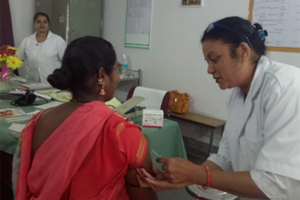
A staff nurse in Indore gives a woman a shot of the Antara injectable contraceptive.
Contributors: Trupti Sharma, Prabhat Jha, Dr. Shalini Sarouthia
The Challenge Initiative for Healthy Cities (TCIHC) is working in Madhya Pradesh (MP), India, to improve access to family planning services among the urban poor. Its work with Indore city officials over the past year has led to a measurable increase in the uptake of the injectable Antara among women living in poor communities.
When TCIHC first arrived in MP in 2017, it held a stakeholder consultation in three MP cities to understand the readiness of urban primary health centers (UPHCs) to initiate fixed day services (FDS). One of TCIHC’s proven approaches, FDS ensures quality family planning services on a fixed day at a fixed time. The consultation revealed most of the UPHCs lacked trained providers to insert and remove intrauterine contraceptive devices (IUCD). The UPHCs also needed the equipment necessary to provide quality family planning services.
To address the equipment problem, TCIHC used data collected through a preliminary analysis to convince the chief medical and health officer (CMHO) of the need, and he, in turn, issued a letter to fulfill the UPHCs’ equipment requirements. The lack of trained providers, however, presented a bigger challenge because it required the GoI to allocate funding for training.
After the GoI expanded the method mix in 2017 to include two new contraceptive methods – the injectable Antara and non-hormonal weekly pills, Chhaya – through a landmark policy decision, TCIHC saw an opportunity to help MP with its training problem. But the accompanying guidelines did not mention the rollout of these new contraceptives in UPHCs.
To make the case for injectables in UPHCs, the TCIHC team gathered data on the uptake of Antara at district hospitals since its launch. Indore city’s data showed less than 100 new clients in six months at the district hospital. The uptake was similar for other major cities in MP.
This data supported TCIHC’s push to get these new contraceptives into UPHCs. But according to the guidelines, the first dose of the injectable must be given by a medical doctor and then follow-up doses can be given by trained paramedical staff. TCIHC told city officials that injectable clients at district hospitals were less likely to return every three months for follow-up doses because of the distance.
Thus, if Antara was made available at UPHCs, then repeat clients could be more easily served, and ultimately it would mean expansion of family planning choices for women. TCIHC also presented a training need analysis of existing staff nurses and auxiliary nurse midwives (ANMs) who, if trained, could competently administer it. It took about a two and half months and several rounds of discussions with the Director of Family Planning and other key officials to convince them to provide Antara in UPHCs.
On Nov. 14, 2017, the Director of Health and Family Welfare at the Health Directorate issued a letter making the new contraceptive available in UPHCs. The letter also clearly mentioned the need for training of doctors and paramedical staff for urban areas, which was not sanctioned by the GoI.
Following this letter, Indore took the lead in facilitating trainings of medical officers and paramedical staff on the new contraceptives. By January 2018, 12 medical officers, 21 staff nurses and 20 ANMs were trained. TCIHC’s field team also coached the accredited social health activists (ASHAs) on these two new contraceptives to spread the word that additional family planning choices were now available at their nearest UPHCs.
“I credit the success of Antara to the spirited staff posted at UPHC with critical support from ASHAs, who were mentored for FP counselling by the TCIHC team.”
-Dr. H.N. Naik, Chief Health and Medical Officer in Indore, who was instrumental in
making sure UPHC staff are trained and family planning supplies are available.
After overcoming these challenges, Antara uptake in Indore increased from 27 new clients in February 2018 to a total of 2,793 beneficiaries in Aug. 31, 2018. The initial acceptors of injectables supported ASHAs and Mahila Arogya Samiti (MAS) members in spreading the message that these new methods are safe, convenient and easily accessible at UPHCs.
In addition, Indore has shown that the uptake of the second dose of Antara is as high as 70% while the dropout rate at the state level is around 60%. Indore’s success was highlighted by Dr. Vandana Khare, Joint Director of the National Health Mission, through a state-level videoconference with district-level health officials of the entire state.
Inspired by the Indore example, other TCIHC cities in MP worked with their district-level officials and gradually increased the uptake of Antara in their cities.


